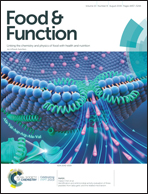Enzymatically modified isoquercitrin promotes energy metabolism through activating AMPKα in male C57BL/6 mice
Abstract
Quercetin possesses various health beneficial functions, but its poor bioavailability limits these functions. Enzymatically modified isoquercitrin (EMIQ) is a quercetin glycoside with a greater bioavailability than quercetin. In this study, we investigated whether EMIQ regulates energy metabolism in mice and its underlying molecular mechanism. Male C57BL/6 mice were fed a normal diet with different doses of EMIQ or quercetin (0.02%, 0.1% and 0.5%) for two weeks. Supplementation with 0.1% EMIQ significantly decreased white adipose tissue (WAT) weight. Supplementation with 0.02% and 0.1% EMIQ promoted phosphorylation of adenosine monophosphate activated protein kinase (AMPK) in the WAT, liver, and muscle. In the WAT, 0.1% EMIQ downregulated peroxisome proliferator-activated receptor (PPAR)γ, CCAAT-enhancer-binding protein (C/EBP)α, C/EBPβ, and sterol regulatory element-binding protein 1 expression, as well as upregulated mitochondrial uncoupling protein (UCP) 2 and carnitine palmitoyltransferase-1 expression. Supplementation with 0.1% EMIQ also promoted the expression of thermogenesis-associated factors including PPARγ coactivator α (PGC-1α), UCP1, PR-domain containing protein 16, and sirtuin 1 in the WAT. In the liver, EMIQ promoted the phosphorylation of acetyl-CoA carboxylase, and increased the expression of PPARα, constitutive androstane-receptor, and farnesoid X receptor. Furthermore, supplementation with 0.02% or 0.1% EMIQ suppressed the plasma glucose level accompanied by the translocation of glucose transporter 4 to the plasma membrane of the muscle. Our results suggest that EMIQ is a potential food additive for the regulation of energy metabolism through AMPK phosphorylation.



 Please wait while we load your content...
Please wait while we load your content...